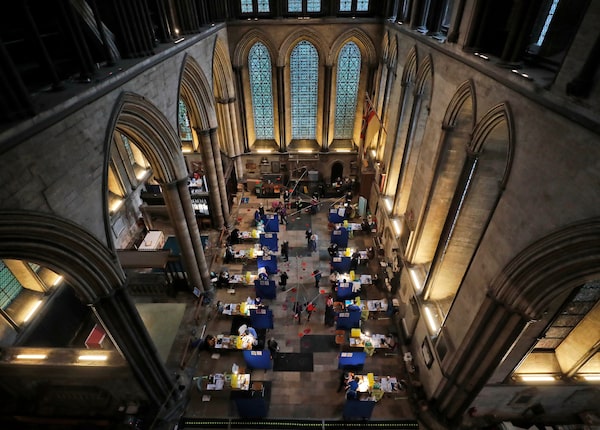
Inside Salisbury Cathedral in Salisbury, England, in January, healthcare workers get ready to inject residents with the Pfizer-BioNTech vaccine.Frank Augstein/The Associated Press
Researchers in Britain have found that one dose of the Pfizer-BioNTech vaccine provides insufficient protection against new variants of the COVID-19 virus and urged public-health officials to be vigilant about ensuring that people receive a second injection.
“We’re looking rather vulnerable to variants after one dose,” said Danny Altmann, a professor of immunology at Imperial College London who co-authored the research.
Dr. Altmann said the findings were especially relevant to countries such as Britain, where most people have had only one dose of a vaccine so far. More than 34.2 million people in the United Kingdom have had one shot and 14.5 million have had two.
“For the situation of countries like the U.K., we’re saying hang on a minute, those people are doing well at the moment, and the U.K. has done well, but watch out and keep your eye on the ball for the variants because [people] are far more vulnerable than you might have expected to the variant strains,” he told a media briefing on Friday.
AstraZeneca, Moderna, Pfizer or Johnson & Johnson: Which COVID-19 vaccine will I get in Canada?
In a study released Friday, the scientists tracked 731 British health care workers for several months last year. About half of those in the study group had contracted COVID-19 during the first wave of the pandemic in March, 2020, while the remainder had not been infected.
The study found that those who’d previously had a mild or even asymptomatic infection had a far higher immune response after one dose of the Pfizer vaccine than those who hadn’t been ill. The immune response was so strong, the study said, that it also offered good protection against the variants first detected in Britain and South Africa.
The study “is basically showing that if you’ve had prior COVID-19, and then you’ve had a single dose vaccine, you are really in a different league in terms of your immune response,” said Rosemary Boyton, a professor of immunology and respiratory medicine at Imperial College who co-authored the study. “It’s almost like the infection has acted as a prime and the first dose has acted as a boost.”
However, the group of volunteers who had not been infected showed a much weaker immune response to the variants after one dose. The study showed that their level of neutralizing antibodies was 11- to 25-fold lower against the B. 1.1.7 variant compared with the original version of the virus, “resulting in the majority of individuals falling below the protective threshold.”
The research team said their findings also likely apply to other variants in circulation, such as the P.1, first detected and Brazil, and the B.1.617 and B.1.618 variants, first associated with India.
While Britain has seen a dramatic drop in infections, deaths and hospitalizations since January, when a variant detected outside London began to spread rapidly, Dr. Altmann urged caution given that new mutations have surfaced.
“One dose in terms of all of our measurable immune parameters of [the Pfizer vaccine] really does look very, very feeble and all the more so against variants,” he said. “And yet whatever the level of immunity that it’s induced, it’s certainly been enough to have had some impact. But it’s really very, very weak compared to two doses. My message from that would be hang on in there for your second dose.”
Both researchers stressed that they weren’t suggesting that vaccines won’t work, but that the public should be careful about the level of protection one jab offers.
“All I would say loud and clear is we’re definitely not saying that the vaccines are useless,” Dr. Altmann said. “We’re actually saying the vaccines are incredibly good. But what we are saying for a country for example like the U.K. that has the majority of its vaccinated people on one dose and also has one eye on the horizon for any incoming variants of concern, that’s a potential real vulnerability. And a solution would be to keep up your guard on the surveillance of variants and get the second dose to people.”
Britain reported 2,381 infections on Friday and 15 deaths as the pandemic continued to show signs of easing. By contrast, the daily infection total in January was frequently above 60,000, and more than 1,200 deaths were announced each day.
Figures released Friday from Public Health England also showed that more than half of the U.K.’s population – 34.5 million people – live in parts of the country that have gone two weeks without a single death from the virus.
“We have come a long way since the beginning of the year, when we saw 20 times the level of infection we see now,” said Sarah Crofts, who runs a weekly infection survey at the Office for National Statistics. “The infection rate has continued to decrease across the U.K., and we are back to levels seen near the end of last summer.”
Health columnist André Picard answers reader questions about COVID-19 variants, how effective the various vaccines are and the impact of on-again, off-again lockdowns.
The Globe and Mail
Our Morning Update and Evening Update newsletters are written by Globe editors, giving you a concise summary of the day’s most important headlines. Sign up today.
 Paul Waldie
Paul Waldie